Every year on September 9th, FASD Awareness Day offers an important opportunity to shed light on Fetal Alcohol Spectrum Disorders (FASD) and their impact on various aspects of health, including ear, nose, and throat (ENT) concerns. At Plymouth ENT, we're committed to raising awareness about these connections and helping families and healthcare providers better understand and manage these challenges.
What is FASD?
Fetal Alcohol Spectrum Disorders (FASD) encompass a range of effects that can occur in an individual was prenatally exposed to alcohol. These effects can be physical, behavioral, and cognitive, and often impact multiple body systems. FASD is a major cause of developmental disabilities worldwide and is entirely preventable.
FASD and ENT Health
Children with FASD may experience a variety of ENT issues. These can range from mild to severe and impact their quality of life. Understanding these potential problems can help caregivers seek the right treatments and interventions early.
1. Hearing Issues
Many children with FASD suffer from hearing problems due to abnormal ear structures or nerve damage. These hearing issues can range from mild hearing loss to total deafness, which can significantly affect their ability to communicate and learn.
2. Sinus and Nasal Problems
Structural abnormalities in the nasal passages and facial structure can lead to chronic sinusitis and other nasal problems in children with FASD. These issues can cause discomfort, breathing difficulties, and infections that require ongoing medical attention.
3. Throat and Speech Issues
Children with FASD often encounter a range of throat issues, including a higher susceptibility to infections like tonsillitis and pharyngitis. These conditions can exacerbate difficulties with speech, which is already a challenge for many affected by FASD. Addressing these throat issues promptly can aid in improving their communication skills and overall well-being.
4. Snoring and Sleep Disturbances
Snoring and sleep disturbances are common in children with FASD. These can stem from the structural abnormalities in the nasal and throat areas, leading to sleep apnea and other sleep-related disorders. Poor sleep can further compound behavioral and cognitive difficulties, creating a cycle that affects health and daily functioning.
The Role of Awareness
FASD Awareness Day is not just about understanding the broad effects of prenatal alcohol exposure but also about drilling down into specific areas like ENT health that profoundly affect the lives of those with FASD. Increased awareness can lead to earlier diagnosis and treatment, which are crucial for managing symptoms and improving quality of life.
At Plymouth ENT, we advocate for comprehensive care approaches that address the ENT health of children with FASD holistically. By recognizing the signs early and consulting with specialists, parents and caregivers can ensure that these children receive the support they need to thrive.
FASD Awareness Day serves as a reminder of the preventable nature of FASD and the spectrum of health issues it can cause. For those caring for children with FASD, understanding the connection between FASD and ENT issues is crucial. It allows for proactive healthcare that can make a significant difference in the lives of affected individuals. At Plymouth ENT, we are here to support, diagnose, and treat ENT issues in children with FASD, helping them lead healthier and more fulfilling lives.
